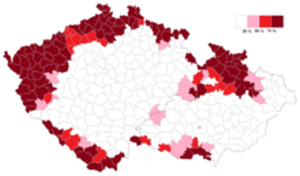“Chamberlain was able to achieve what he called ‘peace in our time’ by offering Germany the Sudetenland region in exchange for a declared end to further territorial ambitions in Europe. There’s no reason it can’t work again, this time with Iran, to much the same result.”
Tehran, February 11 – Iranian officials have yet to respond to the latest American proposal in talks over the Islamic Republic’s controversial nuclear program, a proposal that offers the central European territory of Sudetenland in exchange for guarantees that Iran will pursue no further development of atomic weapons.
US President Barack Obama made the offer earlier this week amid rising concerns that no deal would be reached by March, when legally mandated sanctions on Iran intensify in the absence of an agreement. Obama faces conflicting pressures from his own drive to allow Iran to establish regional hegemony and thus, he hopes, to help stabilize the Middle East, and conservative opposition from Republicans and allies of other Middle Eastern states convinced that Iran’s ambitions have little to do with Western notions of stability. The offer places Obama in a precarious diplomatic position, as the Sudetenland is part of a third sovereign country, but the Nobel Peace Prize laureate believes it necessary to secure a settlement with Iran.
Reaching a deal has become a priority for the president, partially because he has had little to show for his efforts in the international arena. With less than two years remaining in office, Obama has set ambitious goals for his Mideast policy, including both Iran and the moribund Israeli-Palestinian negotiations, both of which have produced frustration as all three of those parties have been far less accommodating to his desires, for unknown reasons choosing to act in what they see as their own best interests instead of what Obama knows to be best. As Iran dithers and delays, growing ever closer to the nuclear threshold, the Israeli-Palestinian front remains deadlocked amid Palestinian unilateral attempts to force concession on Israel and Israeli political paralysis in the pre-election season. The president thus took inspiration from twentieth-century British statesman Neville Chamberlain, who found the Sudetenland worked once before as inducement to a regional deal when Germany flexed its muscles in the 1930’s.
“It’s a daring but proven idea,” says scholar Ann Schluss. “Chamberlain was able to achieve what he called ‘peace in our time’ by offering Germany the Sudetenland region in exchange for a declared end to further territorial ambitions in Europe. There’s no reason it can’t work again, this time with Iran, to much the same result.”
Schluss cautioned that making such a deal work would depend on multiple parties, not all of which are interested in an agreement that leaves Iran with the possibility of developing a weapon. “We don’t know, for example, how the Saudis will take this, but if all goes well, my assessment is that they, and multiple other states, will also pursue nuclear weapons, and there’s nothing that keeps the peace better.”





